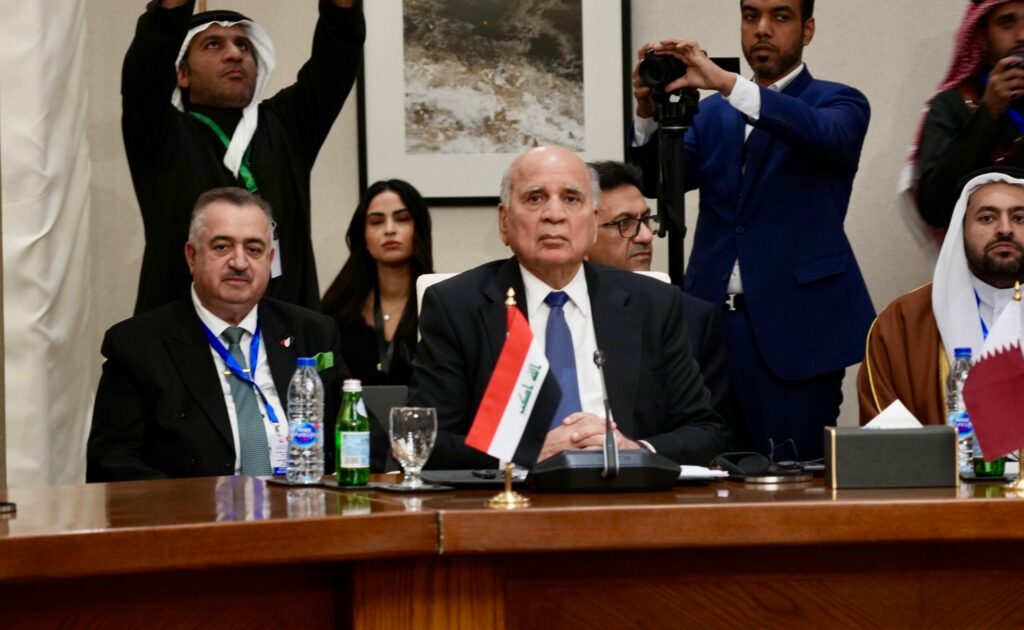Final Statement of the Meeting of Arab Ministerial Contact Committee on Syria

The meeting of the Arab Ministerial Contact Committee on Syria, which includes the Hashemite Kingdom of Jordan, the Republic of Iraq, the Kingdom of Saudi Arabia, the Lebanese Republic, the Arab Republic of Egypt, and the Secretary-General of the Arab League, and with the attendance of the Foreign Ministers of the United Arab Emirates, the Kingdom of Bahrain the current President of the Arab Summit, and the State of Qatar, convened with the release of the final statement as part of the Aqaba meetings on Syria.
Beginning of the text
Upon Jordan’s Foreign Minister invitation, the Foreign Ministers of the Arab Ministerial Contact Committee on Syria held a meeting on 14 December 2014, established by the Arab League resolution No 8914, This committee includes Jordan, Saudi Arabia, Iraq, Lebanon, Egypt, and the Arab League Secretary-General.
The meetings will also be attended by the foreign ministers of the United Arab Emirates, Bahrain (which currently holds the Arab Summit presidency), and Qatar.
The participants discussed the developments that have taken place in Syria over the past few weeks.
The participants emphasized:
- Standing in solidarity with the Syrian people and providing all necessary support during this critical phase, while respecting their will and choices.
- Supporting a Syrian-led peaceful political transition that includes all political and social forces, including women, youth, and civil society, in a fair manner, under the auspices of the United Nations and the Arab League, in accordance with the principles of Security Council Resolution 2254, its objectives, and mechanisms. This includes the formation of an inclusive transitional governing body by mutual agreement among Syrians and beginning the implementation of the steps outlined in the resolution to transition from a transitional phase to a new political system that meets the aspirations of the entire Syrian people through free and fair elections supervised by the United Nations, based on a new constitution approved by the Syrians, within specific timelines according to the mechanisms established by the resolution.
- Supporting the role of the UN envoy to Syria and requesting the UN Secretary-General to provide all necessary resources to begin working on establishing a UN mission to assist Syria in supporting and overseeing the transitional process, and to aid the Syrian people in achieving a political process led by Syrians in accordance with Resolution 2254.
- Recognizing that this critical phase necessitates comprehensive national dialogue and the solidarity of the Syrian people, including all its components, spectrums, and political and social forces, to build a free, secure, stable, and unified Syria that the Syrian people deserve after years of suffering and sacrifice.
- The immediate cessation of all military operations.
- The necessity of respecting the rights of the Syrian people in all its components, without any discrimination based on race, sect, or religion, and ensuring justice and equality for all citizens.
- The need to preserve Syrian state institutions and enhance their capacity to serve the Syrian people, protect Syria from slipping into chaos, and take immediate action to empower a police force to protect citizens, their properties, and Syria’s resources.
- A commitment to enhancing efforts to combat terrorism and cooperating in fighting it, given that it poses a danger to Syria and the security of the region and the world, and its defeat is a shared priority.
- Unconditional solidarity with the Syrian Arab Republic in protecting its unity, territorial integrity, sovereignty, security, stability, and the safety of its citizens.
- Providing humanitarian support needed by the Syrian people, including cooperation with relevant UN organizations.
- Creating secure, living, and political conditions for the voluntary return of Syrian refugees to their homeland and providing all necessary assistance for that, in collaboration with relevant UN organizations.
- Achieving national reconciliation and principles of transitional justice according to legal and humanitarian standards, without vindictiveness, to stop the bloodshed of the Syrian people who deserve an end to their suffering.
- Condemning “Israel’s” incursions into the buffer zone with Syria and its series of sites in the Golan Heights and the Quneitra and Damascus countryside, rejecting these as blatant occupation and violations of international law and the disengagement agreement between Syria and “Israel” established in 1974, calling for the withdrawal of “Israeli” forces, and condemning “Israeli” airstrikes on other areas and facilities in Syria, emphasizing that the Golan Heights is occupied Syrian Arab land that must be liberated, and calling on the Security Council to take necessary measures to stop these violations.
- Recognizing that the security and stability of Syria are foundational to the security and stability of the region, and that we will stand with its people in rebuilding a unified, independent, stable, and secure Arab state for all its citizens, free from terrorism and extremism, without violations of its sovereignty or assaults on its territorial integrity from any party.
- Acknowledging that dealing with the new reality in Syria will depend on how aligned it is with the aforementioned principles and foundations, ensuring the achievement of the shared goal of meeting the rights and aspirations of the Syrian people.
- Coordinating with other Arab states to convene a meeting of the Arab League Council to present the committee’s report on this meeting.
- Engaging with international partners to formulate a unified stance that supports Syria in its efforts to build the future that the Syrian people deserve, in line with the agreed-upon principles above and relevant Security Council resolutions.